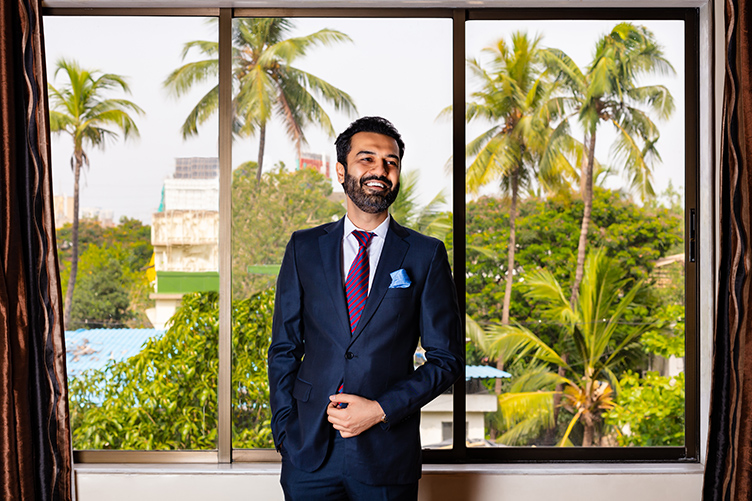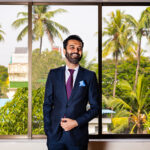By Abhya Adlakha
In the bustling landscape of Mumbai’s hospitality scene, Ashesh L. Sajnani stands out not just for his longevity, but for his measured approach to innovation. After earning his hospitality diploma from Switzerland’s Hosta School of Hotel and Tourism and gaining experience across international establishments, Sajnani opened up Le Café in Chembur in 2004—a decision that would shape both his career and the neighborhood’s culinary identity. What started as a 30-seat European café has since evolved into a cornerstone of the community, while serving as the foundation for OPA Hospitality, his restaurant group that includes ventures like OPA Mediterranean and Bombay Food Truck.
Sajnani’s approach to hospitality is distinctly personal—eschewing rapid expansion for thoughtful growth, and viewing restaurants not just as businesses but as spaces where memories are made. This philosophy has served him well over two decades, with Le Café celebrating its 20th anniversary this year. His ventures have garnered multiple Times Food Awards, including recognition for Best Global, Best Cafe, and Best Regional Indian Cuisine, yet Sajnani maintains the perspective of someone who still gets excited about discovering new flavors in local toddy shops or small French villages.
In this exclusive interview with PEAKLIFE, Ashesh discusses his journey from a coffee enthusiast to a seasoned restaurateur, the delicate balance between tradition and innovation, and why sometimes the best business decisions come from not treating hospitality purely as business.
Let’s start from the beginning—what inspired you to start a café, and how did you imagine it back then?
Ashesh Sajnani: I went to a hotel school in Switzerland, and after finishing my studies, I came back to Bombay and joined Gallops. Gallops was this all-day space back in the 90s. And when I left Gallops, the concept of an all-day space stuck with me. I was obsessed with the idea.
Around the same time, my family owned this old building in Chembur—a very old hotel that no one saw as having much potential. I decided to take it up and turn it into a small café. I’ve always been a big coffee addict. Back then, Barista was just emerging, and coffee culture was booming in India. Coming back from Europe, I wanted to bring that coffee culture here. My goal was to take the Barista model and make it better—create an all-day concept and serve good food along with coffee, something no one was doing on that side of the city.
I always knew I wanted to call it Le Café. A French name felt right, given my love for coffee and the European influence. When I started, it was a small 30-seater café with a very basic menu. I was hesitant. But in my humble opinion, I knew what I was doing. When I was setting up the café, I thought, what’s the worst that could happen? But I thought, it’s okay I’ll manage. With that mindset and the fire in my belly, I went for it.
Like you mentioned, Chembur was a very new concept at the time. What made you choose European cuisine over everything else? How did you make it more accessible to the Indian palate, and how did things progress from there?
Ashesh Sajnani: In the first week, I maybe got 100 people to come and eat. Some of them probably walked in out of curiosity, wondering, Who’s this guy trying something like this? But many of those customers who came in back then are still with me today.
I’ve had people who came as kids and now, in their 20s, still visit. Some tell me stories like, Ashesh, I had my first date here, or After my exams, I came here to celebrate. Others recall coming after they got their results or to launch a new phase in their lives. It’s been amazing to see people grow—students who came for coffee are now CEOs of big companies. Chembur, at the time, was very quiet, but it’s grown so much now. It’s well-connected too—20 minutes to get out of Bombay, 20 minutes to areas like Guru or PKC.
The hospitality industry is known for being tough—it’s hard to turn a profit, and restaurants often come and go. Many of our favorites have shut down, yet you’ve completed 20 years. What’s your secret? What do you think is the key to your success?
Ashesh Sajnani: I don’t own many restaurants, just a few. And honestly, I’ve had my share of failures too. I’ve launched some great concepts that didn’t work—maybe they were ahead of their time, or maybe I just didn’t execute them well. You learn from those experiences. Even with my first restaurant, I made mistakes, but I learned from them. One common mistake people make is not spending enough time with their staff or customers, especially in the beginning. For me, relationships are at the core of everything. Whether it’s with your team or your customers, strong relationships are the foundation of any successful business.
From there, it’s all about consistency—consistently delivering a great product and experience. For most people, a restaurant is more than just food—it’s about the memories and the experience. In a market full of restaurants, consistency and building those connections are what make people choose to return.
Do you think the key to consistency is sticking to tradition, or is it about constantly innovating? What do you think leads to long-term success?
Ashesh Sajnani: It’s a very fine line. So many people wake up one day and say, I want to open a restaurant or a bar. Half of them are drawn to the glamour, but the reality is far from it. Success isn’t always about constant innovation—it’s about understanding food trends and aligning them with your brand.
Sometimes, I’ve done things that resonated with the audience, and sometimes they didn’t. I’ve never gone too far, like serving handvo with crispy bacon on top. Sure, I experiment at private events, but not everything works for a restaurant menu. At the end of the day, it’s about finding that balance between tradition and creativity while staying true to your brand.
You’ve also launched so many exciting and innovative dining concepts. Is that inspired by your travels? I’ve heard you love to travel. How do you keep the creativity flowing?
Ashesh Sajnani: Honestly, travel is everything for me. It’s my biggest source of inspiration. I love going to places for the food, drinks, and the overall experience. I remember traveling to a small village in France 25 years ago just to drink wine. I didn’t even have the money for it—I begged and borrowed from my dad to make that trip. My mom was in shock! But it was worth it.
Travel opens up your mind to new cuisines and cultures. For instance, I went to Nairobi just before COVID and discovered a drink called Dawa. It’s made with sugarcane, lime, mint leaves, and lots of sugar. I’d never heard of it before, but now it’s on my restaurant menu.
Traveling and immersing myself in local kitchens and restaurants is where I learn the most. I’m naturally curious when it comes to food—I always want to know what goes into a dish, the ingredients, and the techniques. I don’t care much about what people think; my focus is on the food and its story.
I remember going to Kerala and visiting toddy bars—it was crazy! The food in Kerala is incredible. I’d make it a point to go to a toddy shop every day and sit with the locals, drink, and watch what they were eating. That’s how you discover the real essence of a cuisine. You see the authentic ingredients, the techniques passed down generations—that’s where the magic is.
What about your favorite restaurant or food experience in the world? If you had to pick one?
Ashesh Sajnani: That’s tough, but I’d say great food experiences include Gallops in Bombay, Hosa in Goa, Pancham Puriwala in Bombay, Le Chamarel in Mauritius, Shake Shack in NYC, Chandralok in Lonavla, and Carnivore in Nairobi. Each of these places has something special that stays with you.
How do you balance your creativity with the business side of running so many ventures? The F&B industry is so competitive—how do you strike that balance between trying something new and ensuring profitability?
Ashesh Sajnani: Honestly, sometimes you won’t make money, and I’ve made peace with that. Since I don’t rely on investor money, I have the freedom to take creative risks and pursue my passion within the business. Being bootstrapped has its advantages—my father helped me get started, and I’ve always avoided borrowing money in hospitality.
Outside of hospitality, I have other businesses, like real estate, and I also run a listed company that manufactures items like steel wires. That’s the business side of things. But hospitality? That’s my creative outlet. It’s where I get to express myself.










